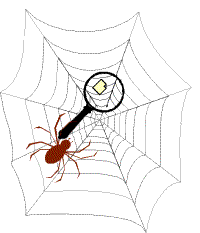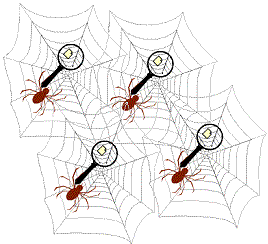Jan's Working with the Web
Searching
You have now learned how to get around on the Web and how to save and print the wonderful stuff you find there. But wait a minute! How can you find something wonderful enough to bother with?
That's like asking how to find a good book. There are lots of ways!
Ways to find interesting places on the Web
- Surfing the Web - Following links from page to page without a particular plan is called surfing. You can often find fascinating places on the Web this way. Sites may have links to similar sites or to sites with related materials. You can quickly wander far from your original purpose. But it's great fun!
- General Publications - You might see a web address in an advertisement, in an article in a magazine or newspaper, or on a business card or letterhead.
- Special Publications - Many magazines and web sites have lists of web sites that are useful, informative, or just plain fun. Unfortunately web sites can fade faster than the sunset. So be quick to follow up on an interesting site. It may not be there later!
- Word of mouth or social media - A friend might tell you about a cool place she found or post a link, picture, or video on Facebook or another social media site. Social media sites often show you links that are trending among the site's members, that is, items that are getting shared a lot.
- Search - Special web sites called search engines or web directories keep track of what's out there on the web.
Ways to Search the Web
 If you are looking for specific information, rather than just something interesting, you need special help. A search engine or a web directory can help you find what you need in the vast pile of web pages around the world.
If you are looking for specific information, rather than just something interesting, you need special help. A search engine or a web directory can help you find what you need in the vast pile of web pages around the world.
The major web directories and search engines are now joining forces to create search sites that work both ways - directory categories and keyword searches at the same time. In such a site you will see a list of general categories as well a search text box.
![]() Language of Search Pages: The home page for all of the major searching sites will be in
English but there are often copies in other languages. Look for a
link to International versions or for a link for the language or
country of your choice.
Language of Search Pages: The home page for all of the major searching sites will be in
English but there are often copies in other languages. Look for a
link to International versions or for a link for the language or
country of your choice.
Search Engine
A search engine is like an index in the back of a book. A search engine uses a computer program, called an intelligent agent, a spider, a crawler, a robot, or just a bot, which crawls from link to link through the Web looking at the pages.
The spider analyzes each page based on such things as:
-
words in the actual URL
- words in the TITLE tag
- keywords in the META tag in the source code of the page
- words in the text and ALT text for images on the page
- how many other pages link to the page
- how closely the actual content of the page matches the keywords in the META tag
You ask the search engine to look in its database for web pages that contain certain words or phrases. You get back a list of all such pages that the search engine knows about. You can easily get a list of hundreds of thousands of web pages.
Each search engine uses a different method of evaluating a page. They differ in how often they update their data and in how they analyze the pages. Thus, you will get a different list from each search engine, even if you use the same words in your search request.
There are a number of powerful general purpose search sites. Plus, there are other search sites which specialize in particular areas of interest or in the documents on a particular network. New search engines are being developed all the time. They are getting better all the time, too - faster, more pages in the database, and better at guessing which pages are actually what you are looking for.
Examples of search engines include Google, Bing, Yahoo, Ask, DuckDuckGo
Web Directory
A Web directory or subject guide is like the table of contents for a book. It sorts web pages into general categories, like Travel, Technology, Science, and Art, and then into more specific subcategories. For example, the category Travel might include such subcategories as Europe, Asia, air travel, cruises, travel agents, lodging, and maps. By digging down through several levels of categories, you can reduce the huge number of web pages related to Travel to a manageable pile of pages closely related to your question. Such directories are a good choice when you are looking for general material. A search engine is a better choice when you need specific information.
Some web directories list only pages that the human staff has reviewed and categorized. They may also give rankings like ![]() or
or ![]() based on how interesting or useful the page actually is.
based on how interesting or useful the page actually is.
Pages can also be categorized by "intelligent" software. However, people think more like you do than computer programs do. The pages categorized by people are more likely to be what you want. Sadly, no staff can keep up with the immense number of new pages that are posted to the Web every day. Search engines will have more pages in their databases than web directories do since they can find pages automatically.
A web directory can be searched itself. Some can even show you pages that are related to your keywords but which do not actually contain the words you picked for the search. For example, if you search using the words "elderly people", you might be shown pages about "retired people" also. Very smart!
Example of web directory: Open Directory.
 Metasearch
Metasearch
A metasearch site runs your search on several search engines and web directories at the same time and presents you with a single list of results. Even if this shotgun approach does not produce the pages you want, it could show you which search services to use to dig deeper. Different services work best for different types of searches. Do not restrict yourself to just one.
Examples of metasearch sites include Dogpile, Mamma, Info.com, Webcrawler
Searching Tips
| Spelling | Correct spelling usually works best! On the other hand, some web
authors are not very good spellers, especially of names. You might
find that special page by checking spelling variations on your
search words. For example, for Clarence Thomas you
could also look for Clarance and Tomas. |
| Plurals | A search for car is not the
same as a search for cars. Some search sites are pickier than others about this kind of difference. You may need to include
both words in the search to get what you want or else search on each
separately. |
| Similar words | Check out synonyms for your words. For example, to look for sites about cars you could search with words like auto, sedan, or minivan in addition to car. |
| Natural language | Many search engines invite
you to enter a regular question instead of keywords,
like Where can I find a good restaurant in New
York? Most of the time you are more likely to find what you are looking for
if you just use several keywords, like "New York" restaurants. |
| Where are you searching? | On many search pages you can easily search within a category
when you meant to search the whole web, or the other way around.
Searching the category Travel for the keywords lung
cancer will not produce many related web
pages! |
| Save | If you get an interesting list of search
results, save the page that lists the results or save selected items
in the list. If you run the search again tomorrow, you may not see
the same list. Those wonderful sites may be buried in the pile
again. |
